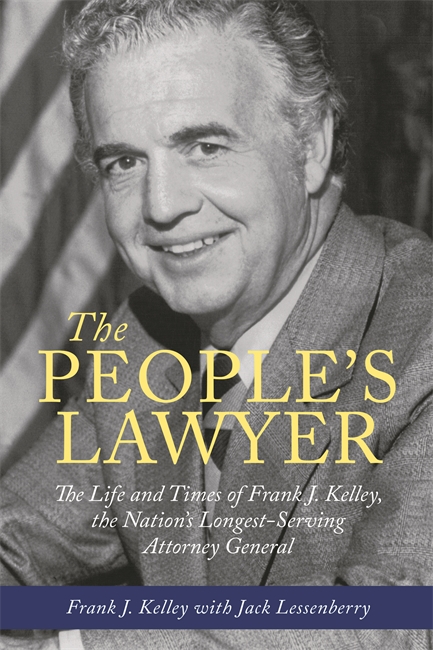By ANDI BRANCATO
Capital News Service
LANSING – “The People’s Lawyer” is a more-than-apt description of Frank Kelley’s career as Michigan’s—and the nation’s—longest-serving attorney general.
And it’s the perfect title for Kelley’s recently released autobiography, written with Wayne State University journalism department chair Jack Lessenberry. The book offers highlights of Kelley’s unmatched 37 years as Michigan’s top attorney.

Credit: Wayne State University Press
“The People’s Lawyer” (Wayne State University Press, $34.99) has received a fair amount of publicity, all of it warranted. Kelley’s record will likely remain untouched, since term limits have restricted an attorney general from serving more than eight years, and so the wealth of knowledge he attained won’t be achieved again.
The book starts with the foundation of Kelley’s life, growing up in the era of Prohibition with a father who ran a speakeasy in Detroit. People familiar with Michigan will remember the landmarks that Kelley references and the history of the city that he vividly describes.
Michigan history buffs will enjoy Kelley’s early job on the docks at the tip of the Mitten, before the Mackinac Bridge made crossing between the Upper and Lower peninsulas no big deal.
Followers of government will see the inner workings and sometimes conflicts between governors of both parties and their top lawyer.
Students of the law will be fascinated by Kelley’s reshaping of the office of the attorney general into one that wouldn’t shy away from taking on the big guys to protect the little ones.
Journalists will see little-known details of stories they may have covered on the state government beat.
And, with any luck, Kelley’s wish will come true that the book will inspire young people considering careers in public service to see it as a good and noble profession. In one of two dedications, Kelley offers the book to “the next generation of young Americans who hear the call of public service and are determined to do whatever they can to make this a better nation and a better world.”
Near the book’s end, he writes, “A life of public service, a life lived in the service of your fellow man, is worth living.”
Of course the autobiography details significant milestones in his career, among them establishment of the country’s first Office of Consumer Protection, the PBB contaminated cattle feed crisis and the fight for fair voter representation in the Legislature.
He writes proudly of his many protégés and mentees, the most famous among them two lawyers, James Blanchard and Jennifer Granholm, who went on to win elections as governors.
Equally as entertaining as the legal stories are insights into his shoulder-rubbing with the political and world leaders of the day, whatever that day might have been.
His obvious idolization of the Kennedys, both President John F. Kennedy and Attorney General Robert Kennedy, is genuine. In fact, he writes proudly of a call from Robert Kennedy just a few days after being sworn into office.
The list of others whose paths he crossed — among them presidents, candidates, labor chiefs and international heads of state — is long and impressive, to say the least. He offers unique insights that shed light on their character and decision-making processes.
But the book also has some interesting and little-known facts.
Among them: when he moved to Arizona in the early 1940s for health reasons, he struck up a friendship with a young man who’d moved there for similar reasons. Steve Allen went on to become an entertainment success, hosting his own talk show, and they maintained their friendship.
At times the narrative seems tedious, particularly in the early portion in which Kelley describes his rise to the attorney general’s office. Readers may wish he would just get to the events that they remember.
But it becomes apparent that the details of Kelley’s early life cannot be overlooked because they shaped him into the adult he became and are at the root of his becoming so accomplished a public servant.
And too, at times the tone of the book seemed almost chiding, with reminders from Kelley like “You have to remember…,” “You have to understand…” and “As I’ve said…”.
But the flip side of those reminders is the conversational tone they lend the book. Reading it is like having an actual conversation with Frank Kelley.
That tone makes “The People’s Lawyer” an easy, enjoyable and, yes, inspirational read. One needn’t know the history of the attorney general’s office, be a resident of the state, be a government employee or be a student of the law. It is simply a good, entertaining book that affords insights into a truly great public servant.
At a recent book-signing where he and co-author Lessenberry discussed the book and Kelley’s career, Kelley said more than once that he’d had a good life and is the “luckiest guy in the world.”
He acknowledged, in a choked voice, the recent unexpected death of his wife, which clearly has tempered his happiness. But he remains genuine, thanking the audience for the therapeutic opportunity to spend time with friends.
The citizens of Michigan are the ones should be offering their thanks.
Capital News Service copy editor Andi Brancato is a former Capitol reporter and state agency communications director.